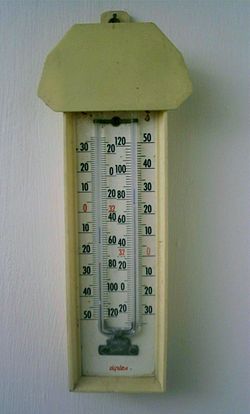AY Honors/Weather - Advanced/Answer Key/es
| Climatología - Avanzado | ||
|---|---|---|
| Asociación General
|
Destreza: 2 Año de introducción: 1949 |
|
Requisitos
1
Para consejos e instrucciones, véase Climatología.
2
3
Cold Fronts
A cold front is defined as the leading edge of a cooler and drier mass of air. The air with greater density wedges under the less dense warmer air, lifting it, which can cause the formation a narrow line of showers and thunderstorms when enough moisture is present. This upward motion causes lowered pressure along the cold front. On weather maps, the surface position of the cold front is marked with the symbol of a blue line of triangles/spikes (pips) pointing in the direction of travel. Cold fronts can move up to twice as fast as warm fronts, and produce sharper changes in weather than warm fronts, since cold air is denser than warm air it rapidly replaces the warm air preceding the boundary. Cold fronts are typically accompanied by a narrow band of showers and thunderstorms. Cold fronts are usually associated with an area of low pressure, and sometimes, a warm front.
4
4a
4b
4c
4d
4e
4f
4g
4h
4i
5
Registering Thermometer

6
7
The amount of water that air can hold depends on the temperature. The hotter it gets, the more water the air can hold. At any given temperature, the air can become so saturated with water that it cannot hold any more. Water will not evaporate under this condition.
8
The Earth's atmosphere consists, from the top down, of the exosphere, thermosphere, mesosphere, stratosphere, and the troposphere.
9
This requirement is very similar to one found in the Explorer IA curriculum, except that Explorers are required to keep these records for two weeks and take readings twice a day. You can also combine these requirements with those in the Weather honor. If you forget to take records for a day, do not despair. As long as you have 21 readings, you can count this as three weeks.
9a
9b
If you decide to build a barometer, you can use official readings to calibrate it.
9c
Note the cloud types (Cirrus, Stratus, Cumulus, or Nimbus).
9d
Unless you have a registering thermometer or a digital thermometer that records the daily extremes, this will have to come from official records.
9e
If you make your own anemometer, be aware that the reading will vary substantially throughout the day. Therefore, you should not be discouraged if your readings and the official readings to not agree.
9f
When you record the day's weather, jot down the forecast as well. The comparisons can be made the next day or at the end of the three week period.
10
Man has a greater impact on the climate than on the weather. The weather is the day-to-day conditions, while the climate covers long term averages. Man's production of greenhouse gases (such as carbon dioxide) has had and is having an effect on the global climate. These changes affect rainfall (increases in some areas, decreases in others) and the severity of storms.
Note too that the temperature in the city is invariably warmer than the temperature in the outlying areas. This is mostly because of pavement which readily absorbs heat during the day and then releases it during the night.
Dams create reservoirs which facilitate more evaporation than if the river were allowed to flow naturally. This increases both humidity as well as rainfall.
Referencias
- Categoría: Tiene imagen de insignia
- Adventist Youth Honors Answer Book/Honors/es
- Adventist Youth Honors Answer Book/es
- Adventist Youth Honors Answer Book/Skill Level 2/es
- Categoría: Libro de respuestas de especialidades JA/Especialidades introducidas en 1949
- Adventist Youth Honors Answer Book/General Conference/es
- Adventist Youth Honors Answer Book/Nature/es
- Adventist Youth Honors Answer Book/Nature/Primary/es
- Adventist Youth Honors Answer Book/Stage 0/es
- AY Honors/Prerequisite/Weather/es
- AY Honors/See Also/Weather/es



